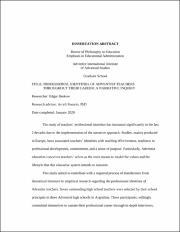Professional identities of Adventist teachers throughout their career : a narrative inquiry
Abstract
The study of teachers’ professional identities has increased significantly in the last 2 decades due to the implementation of the narrative approach. Studies, mainly produced in Europe, have associated teachers’ identities with teaching effectiveness, readiness to professional development, commitment, and a sense of purpose. Particularly, Adventist education conceives teachers’ selves as the main means to model the values and the lifestyle that this educative system intends to transmit.
This study aimed to contribute with a required process of transference from theoretical literature to empirical research regarding the professional identities of Adventist teachers. Seven outstanding high school teachers were selected by their school principals in three Adventist high schools in Argentina. These participants, willingly committed themselves to narrate their professional career through in-depth interviews,
aesthetic portrayals, curriculum vitae, and shadowing. By utilizing these four sources of data, the narratives of each participant were restoried with the essentials of each narrative synthesized and sequenced in a chronological time frame to provide meaning to their professional identities in context.
The data analysis followed a recursive process between the restorying of the narratives and a qualitative thematic analysis. The findings of the study revealed the coexistence of current (ongoing) identities and a shared ideal professional identity among the selected teachers. As the participants strived to become the ideal professional self they set before themselves, their ongoing professional identities followed a five-phase cycle of professional identity development: (a) pre-identity, (b) proto-identity, (c) identity awareness, (d) identity authentication, and (e) identity projection. These findings provided insights that can improve the mission effectiveness of Adventist teachers through a process of narrative-based professional identity reflection. From the findings of this study, practical implications are also provided to educational leaders, Adventist universities offering teaching training programs, and teachers.


